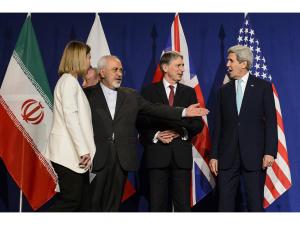The United States-Iran framework on Nuclear deal, which still must find muster from Capitol Hill in June, is a pivotal moment in recent world history.
Washington and Tehran, at each other’s throat for the last four decades, seem to have aligned their goals which have thrown all existing equations out of the window.
It has upset US allies in the Middle East–Saudi Arabia and Israel–badly enough to trigger some extreme steps: Saudi Arabia is in the midst of military operations in Yemen while Israel’s Prime Minister Benjamin Netanyahu in March made a historic appeal in US Congress in a late bid to stop the US-Iran deal.
On March 26, Saudi Arabia threw its Yemen dice in the hope that US would rise in support and pit itself against Iran-backed “rebel” Houthis. That in turn, they hoped, would derail the Lausanne negotiations between US-Iran which had begun a day earlier on March 25.
Israel had relied all along on Iran threat to divert world’s attention from its excesses in Palestine. With the prospect of US-Iran being on the same page, Israel feared losing the “threat” card. Hence Netanyahu’s last-ditch appeal to the Capitol Hill.
It sure threw US president Barrack Obama in a corner. He was careful enough to support Saudi invasion of Yemen yet ensured he didn’t utter a word against Iran. US also held itself in check when a rattled Tehran declared N-talks could fail. For US, this was an eventuality they didn’t wish to consider.
For the past 19 months, US and its allies have slapped economic sanctions on Iran. It was intended to make sure that Syria loses Iran’s support and hence become vulnerable to Saudi-Qatar nexus.
The situation spun out of control when ISIS destabilized both Syria and Iraq. With Al Qaeda in Yemen, the Middle East was beginning to break into pieces. US realized Iran, a major in the region, just couldn’t be allowed to disintegrate either. Further, it could then easily fall into the arms of either China or Russia.
It’s threats were heightened when in January 2015, Iran and Russia signed a significant military deal. With China and Russia closer than ever, the pivot of China-Iran-Russia could have taken US completely out of equation in Eurasia. US had begun its pullout from Afghanistan; its impact on Iraq had also begun to diminish. US wanted to remain a player in Middle East. Iran was needed at all costs.
However, US needed a reason to lift its economic sanctions. Hence, its’ insistence on face-saving Nuclear-deal with Iran. US knows that countries which want to be Nuclear powers become one anyway—the instances of India and Pakistan come easily to mind. Besides, Iran’s supreme leader Ayatollah Khamenei has termed nuclear weapons as un-Islamic and totally off-limits on numerous occasions. Tehran also subscribes to Nuclear Non-Proliferation Treaty (NPT) while Israel doesn’t care about it.
The situation remains combustible. Netanyahu terms this current framework as one that will “threaten the survival of Israel.” He warned it would increase the risk of a “horrific war.”
Saudi Arabia, on the other hand, still hasn’t put army on the ground in Yemen even though 150,000 of its troops mass the border. Middle East could still unravel quickly.
For the moment, the troubled history of Middle East has charted a new course. We would be watching.


